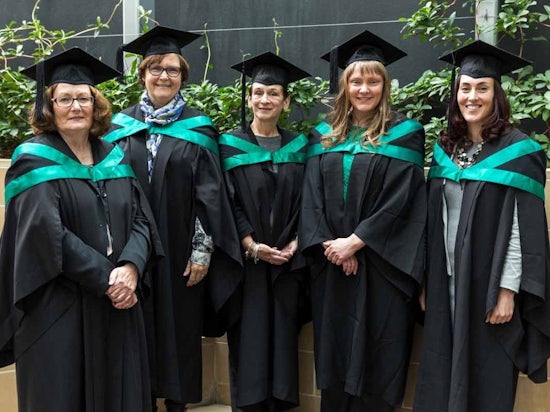First Bachelor of Dementia Care graduates join growing pool of expertise
Australia’s first graduates of the Bachelor of Dementia Care proudly took to the stage recently, for their winter graduation ceremony.

Pictured from left: Bachelor of Dementia Care graduates Suzanne Teague, Jillian Chisolm, Marcia Penn, Melisa Sincock, Evthoxia Lynch, (absent Janet Siversen).
The Bachelor of Dementia Care is Australia’s first degree in dementia care and a flagship degree of the Univeristy of Tasmania’s Faculty of Health’s Wicking Dementia Research and Education Centre.
The fully online course is available to domestic and international students, ranging from carers to health professionals, and is aimed at developing specialised knowledge and helping graduates make a difference to the lives of people living with dementia.
Graduate Suzanne Teague, who used her retirement to study for her degree, says it was a rewarding and practical achievement.
“I enjoyed the course and as well as gaining new knowledge I found out a bit more about myself,” she says.
“I am aiming to eventually undertake the Bachelor of Dementia Care honours program and in the meantime, if there is a part-time employment opportunity where I can help those with dementia or their families, I will consider that option.”
Wicking Centre Co-Directors, Professor James Vickers and Professor Andrew Robinson are proud to see the first six Bachelor graduates complete the Dementia Care program, which they believe will be an important part of future dementia care in Australia.
“The graduation of our Bachelor of Dementia Care students marks an important milestone in our mission to transform dementia care in Australia,” Professor Robinson says.
“With the escalating numbers of people with dementia, this condition is the public health issue of our times, reaching across all strata of society, with major economic and health resource impacts.
“The University of Tasmania has shown national leadership in preparing for this challenge by supporting this first-ever degree focused on dementia understanding and care.”
In addition to the new Bachelor graduates, The Wicking Centre has a growing Dementia Care alumni also including 16 Associate Degree and 96 Diploma graduates.
Professor Robinson says he hopes this growing pool of expertise would build capability and leadership for dementia care in multiple settings throughout the community and in residential care.
“Enhanced understanding through education will also help make our society more dementia-inclusive,” he says.
Image: Natalie Mendham Photography











![The new Aged Care Act exposure draft is slated for release in December of 2023, but advocates hope to see it rolled out on January 1, 2024. [Source: Shutterstock]](https://agedcareguide-assets.imgix.net/news/articles/wp/agedcareact__0811.jpg?fm=pjpg&w=520&format=auto&q=65)












Comments